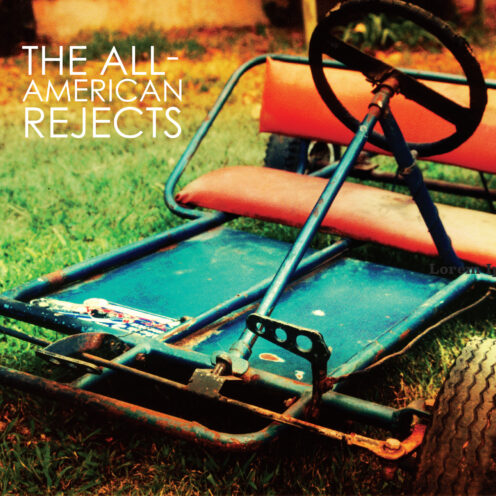
My first impressions of The All-American Rejects, and their pop-centered rock, were generally favorable. The band stormed onto the scene with their charming first single, “Swing, Swing,” that carefully swayed from swooning falsetto vocals, from frontman Tyson Ritter, to a more lush tenor sound with ease. The single seemed to be played everywhere from baseball games, to grocery stores, and it was undeniably catchy. Their self-titled LP was produced by Tim O’Heir (The Starting Line, Say Anything) and he does a nice job of accentuating the best parts of the band on this fairly straight-forward collection of songs. A little know fact about the debut is that when the album was recorded, Tyson Ritter and Nick Wheeler were the only two band members, and it was until the band would shoot their video for their debut single that they would add Mike Kennerty on rhythm guitar and Chris Gaylor on drums. This lineup is still intact to this day, and The All-American Rejects would see even greater success with their sophomore album, Move Along. The All-American Rejects would go on to sell a million copies in the United States, and solidify the band as a marquee name in the pop-rock realm for the foreseeable future. The album was recently reissued on a “Ghostly Green” vinyl that includes a bonus 7″ vinyl on “Coke Bottle Green” to further celebrate the 20+ years that have passed since this record came out.
The refreshing nature of the songs that come out of the gate on their debut are as utterly catchy as they are slick in their production. “My Paper Heart” opens the door wide open with its straight-to-the-chorus approach of the song structure, while other early standouts like “Your Star” leave a memorable taste in the audiences mouths as the album unfolds. “Swing, Swing” is placed well in the sequencing of the songs, while the album’s final single, “Time Stands Still,” failed to get much traction on radio. Looking back, it’s kind of a curious choice to kill the momentum gained from “Swing, Swing” and the second single, “The Last Song” with a mid-tempo ballad about a lost love. “My Paper Heart” or “Your Star” would’ve likely found greater success as marketable third singles, but not much can be done about it now.
”One More Sad Song” tells a story of the disconnect between a relationship on its last legs, with lyrics like “One boy, one girl / Two hearts, their world / Time goes by, secrets rise.” The frenetic guitar riffs by Wheeler are paired well with the keyboards on the song, and makes for a solid transition from the previous ballad. “Why Worry” closes out the front-half of the record that is filled with plenty of heartfelt moments on it, as Ritter provides more details on his relationship as he sings on the pre-chorus of, “If it’s love, I will differ / I’m being lost being with her / I can’t move on, I can’t take it,” to paint a picture of a love-torn musician.
”Don’t Leave Me” brings the upbeat tempo back up to help re-capture the momentum gained from the early standout tracks, while mid-tempo rockers like “Too Far Gone” and the pop-rock of “Drive Away” end up feeling like album filler in the grand scheme of things. The synth-pop of “Happy Endings” rocks along like a Motion City Soundtrack single, while “The Last Song” leaves just the right feeling with the audience as they look for the repeat button on the record.
The self-titled effort would receive generally favorable reviews by music critics during the promotional cycle of the album, while more critical pieces on the album would say state that the lyrical material was a little “too thin, and covered the same subject in each song.” While many of these songs do cover the feelings of falling in and out of love, I feel that that assessment is a tad too harsh for a band just getting their footing in the crowded pop-rock scene of the early 00’s. Move Along would double the commercial output of its predecessor, selling over two million units in the U.S., but you never forget your first love. The All-American Rejects is a great starting point for a band trying to figure out what type of band they wanted to be, and as it would turn out, the kids were alright after all.
 Swing, Swing
Swing, Swing